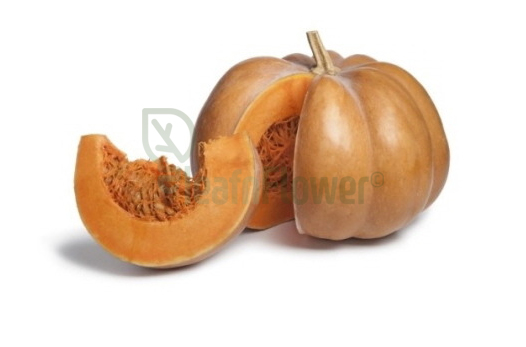Description
Details
Pumpkin is an extremely nutrient-dense food, meaning it is chock-full of vitamins and minerals but low in calories.
The potassium contained within pumpkins can have a positive effect on blood pressure.
The antioxidants and vitamins contained within pumpkins could prevent degenerative damage to the eyes.

Many studies have suggested that increasing consumption of plant foods like pumpkin decreases the risk of obesity and overall mortality. It can also help stave off diabetes, heart disease, and promote a healthy complexion and hair, increased energy, and overall lower weight.
Pumpkin is one of the best-known sources of beta-carotene, a powerful antioxidant that gives orange vegetables and fruits their vibrant color. Beta-carotene is converted to vitamin A in the body once it is eaten.
Consuming foods rich in beta-carotene may reduce the risk of developing certain types of cancer, offer protection against asthma and heart disease, and delay aging and body degeneration.
Additional
Additional
| Health Benefits | alcoholic hepatitis, blood pressure regulation, Eyes, good to heart, immune, mineral, vitamin |
|---|---|
| Directions | Shake/Blend of the powder with water. You may also use for baking or hot tea. |
| Product Package | Powder, Pouch |
| Good herbal formulation | Jujube, Rhizome of Atractylodes lancea, Longan Fruit |
| Storage Temperature | room temperature |
| Country of origin | Korea |
Reviews
Health
Blood pressure
Eating pumpkin is good for the heart. The fiber, potassium, and vitamin C content in pumpkin all support heart health.
Consuming adequate potassium is almost as important as decreasing sodium intake for the treatment of hypertension (high-blood pressure). Other foods that are high in potassium include cantaloupe, avocado, pineapple, tomatoes, oranges, spinach, and bananas.
Increased potassium intake is also associated with a reduced risk of stroke, protection against loss of muscle mass, preservation of bone mineral density, and reduction in the formation of kidney stones.
Cancer
Research has demonstrated a positive relationship between a diet rich in beta-carotene and a reduction in the occurrence of prostate cancer; this is according to a study conducted by the Harvard School of Public Health's Department of Nutrition.
Beta-carotene has also been shown to have an inverse association with the development of colon cancer in the Japanese population.
The authors of the study concluded:
"We found a statistically significant inverse association between higher plasma lycopene [a type of beta-carotene] concentrations and lower risk of prostate cancer, which was restricted to older participants and those without a family history of prostate cancer."
Eye Health
The antioxidants vitamin C, vitamin E, and beta-carotene (all of which are found in pumpkin) have been shown to support eye health and prevent degenerative damage.
A higher intake of all fruits (3 or more servings per day) has been shown to decrease the risk of and progression of age-related macular degeneration.
A study, involving more than 100,000 participants, investigated the effect of antioxidant vitamins and beta-carotene on age-related maculopathy (ARM) - damage to the part of the eye that provides our central vision.
They concluded that "These data suggest a protective role for fruit intake on the risk of neovascular ARM."
Fertility
For women of child-bearing age, consuming more iron from plant sources such as spinach, beans, pumpkin, tomatoes, and beets appear to promote fertility, according to Harvard Medical School's Harvard Health Publications.
The vitamin A in pumpkin (consumed as beta-carotene then converted to vitamin A in the body) is also essential during pregnancy and lactation for hormone synthesis.
Immunity
Plant foods like pumpkins that are high in both vitamin C and beta-carotene offer an immunity boost from their powerful combination of nutrients.
How To
How to eat Healthy Natural Powder :
Pour cold or warm water into a cup or bowl (200-250ml), take appropriate amount of healthy natural powder (2-3spoons) and stir well.
You may add honey, sugar, or salt. You could pour milk or soy mailk.
Notice :
Because of grain characteristics, opened product can be contaminated with foreign substances,
molds and others by air contact and worms can be found so please eat as soon as possible and seal the package tightly in case of refrigerator.
Not recommended for pregnant women.
DISCLAIMER
Some individuals may have adverse reactions to certain plants, herbs, and other natural products.
On any issue where no specific advice is given to consumers please follow this general advice; if you are currently taking the product;
you are advised to discontinue use and consult your pharmacist or herbal medical doctor.
When speaking to your doctor or pharmacist you may find it is helpful to take a copy of this MHRA advice about the product with you.
You should continue to take any medication prescribed by your doctor.
FAQ
Frequently Asked Questions
A: Generally you boil 20g of tea/herb with 2L. of water. The ratio does not matter. However, it is recommended that you control the
saturation of the tea (how strong it is) depending on your personal
preference and body condition.
A: It depends on the tea/herb.
For leaves: boil for 15~20 min.
For hard fruits, roots, and stems: If you soak the tea/herb in water
for 1~2 hours before boiling, you can save time in boiling, and also
get a deeper flavor than without soaking.
A: Currently, what is listed on the site is what we mostly deal with in
retail stores. However, if there is a certain tea/herb that you wish to
get, you can send an email to info@leafnflower.com. or 844-344-0622.
Then, we may offer a price for obtaining the tea/herb, answer questions, and even offer purchase.
A: Yes, you can combine 5~10g of teas/herbs that you already have with Leafnflower.com's teas/herbs.
Although brewing one tea/herb is still good, combining 2~3 teas/herbs helps bring out
the remedial effects of the tea/herbs better than brewing just one tea/herb. However, most tea/herbs contain natural toxins,
and it is recommended that you boil 1~2 pieces of liquorice root along with the tea/herb to remove the toxin.

